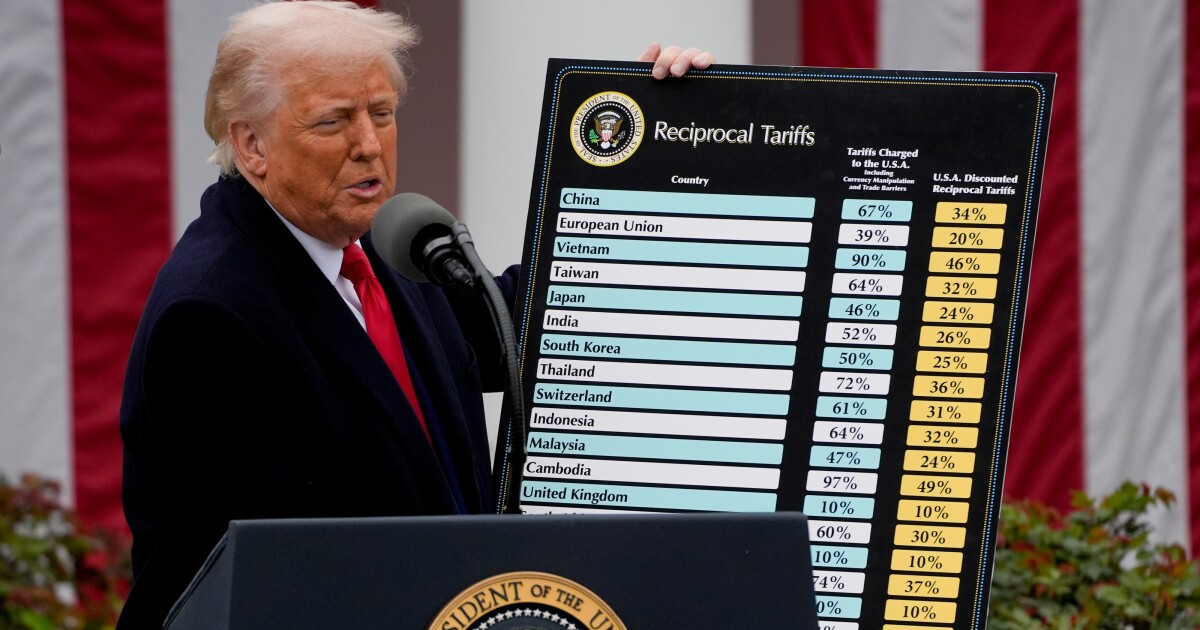President Donald Trump’s appetite for new tariffs remains undeterred, even after a pair of court decisions hit his signature duties with their most devastating blow yet.
White House officials quickly signaled Thursday that Trump will aggressively pursue legal challenges and, if they fail, move forward with many of the same levies through other authorities.
The administration said it would go to the U.S. Supreme Court as soon as Friday if a federal appeals court does not keep the initial order from taking effect while its appeal continues. The Court of International Trade on Wednesday blocked the president’s sweeping global tariffs, citing his reliance on the International Emergency Economic Powers Act, or IEEPA.
“America cannot function if President Trump — or any other president, for that matter — has their sensitive diplomatic or trade negotiations railroaded by activist judges,” White House Press Secretary Karoline Leavitt said Thursday. “Ultimately, the Supreme Court must put an end to this for the sake of our Constitution and our country.”
Later Thursday, a second federal judge declared a number of Trump’s tariffs enacted using emergency powers unlawful, but limited his decision to the family-owned business that sued and delayed the order from taking effect for 14 days to allow the Justice Department time to appeal.
But for a president eager to use trade policy to reshape global commerce, other policy options are far from a quick fix.
Some of the other powers are laborious to use and would take months or more to execute, while others are capped in scope and duration. Administration officials made clear they intend to restore the levies one way or another, even as the government appeals
“We’ve got a very strong case with IEEPA, but the court basically tells us if we lose that, we just do some other things,” White House trade adviser Peter Navarro told Bloomberg Television on Thursday. “So nothing’s really changed. I want to say this to the world: ‘You’re cheating us. We’re coming after you. Deal, and let’s make this right.'”
For all of the confidence on Trump’s team, Wednesday’s court ruling marked one of the biggest setbacks of the president’s second term. Trump campaigned on using tariffs to combat what he calls other nation’s unfair treatment of the U.S., and the emergency law gave him the fastest avenue to deliver on his pledge.
The ruling would reduce the effective U.S. tariff rate to below 6% from a high of almost 27% last month, according to Bloomberg Economics calculations, an astronomical level that risked stagflation for the US.
The legal order also injected even more uncertainty into a world economy already rattled by Trump’s ever-changing posture on import taxes. It may sap Trump’s leverage as his team negotiates with numerous trading partners seeking tariff relief.
The decision blocked tariffs on Mexico, Canada, China as well as a flat import tax on almost every U.S. trading partner. Trump invoked the law on the grounds that fentanyl and trade deficits are each emergencies necessitating the broad use of executive power. The court ruled he went too far.
The White House on Thursday said it is looking at other options, but advisers acknowledged the potential for them being more time-consuming.
“There are different approaches that would take a couple of months to put these in place and using procedures that have been approved in the past or approved in the last administration, but we’re not planning to pursue those right now,” National Economic Council Director Kevin Hassett said Thursday on Fox Business.
Yet amid mounting concern about the vulnerability of Trump’s IEEPA-based tariffs, the administration had already embraced separate legal authorities to pursue other levies.
The Trump administration has invoked Section 232 of the Trade Expansion Act to set the stage for sweeping levies that could touch everything from smartphones to jet engines.
Since Trump took office in January, the Commerce Department has already enacted Section 232 tariffs on steel, aluminum, vehicles and auto parts, and launched investigations on trucks, copper, lumber, semiconductors, critical minerals, pharmaceuticals and aircraft.
Those tariffs are seen as less legally vulnerable than Trump’s ad-hoc nation-by-nation approach, but take months to enact. The probes typically produce findings within 270 days, but administration officials have stressed they can go faster.
Navarro said that U.S. Trade Representative Jamieson Greer would address other avenues soon. “Any trade lawyer knows it’s just a number of different options we can take,” Navarro said.
A shift in strategy could be time-consuming, dragging out both the uncertainty of Trump’s tariff policy and the timeline for him to see some domestic political impact.
Ticking clock
“The idea that Trump is going to turn to plan B and do tariffs by other means has problems,” said James Lucier, managing director at the research firm Capital Alpha Partners. “Yes, he will do it. But he is running out of time to do tariffs and get results before the midterm elections.”
Even so, taking the time to build an ironclad case for tariffs using other legal authorities is key to ensuring they survive court scrutiny and, perhaps, future elections, analysts said.
“If Trump jumps through the hoops and does all the paper for Section 232 tariffs, then he may have tariffs that are legally sustainable,” Lucier said. “If he wants to complete a sloppy pro forma process in six weeks, the same deep-pocketed anti-tariff folks who came after him on IEEPA will come after him on 232.”
The court’s ruling also nodded to Section 122 powers — which Trump could use to impose tariffs on nations of as much as 15%, but only for about five months — as another avenue. Navarro conceded the administration had avoided doing so originally because of restrictions on how long those tariffs could remain in place.
“Well, Section 122 only gives you 150 days. So there’s your answer right there,” he told Bloomberg Television.
Trump has also used authorities under Section 301 of the U.S. Trade Act of 1974 to enact previous tariffs on China. Whether he will now try to enact more duties through that authority, including on China, is unclear.
Section 301 empowers presidents to take a range of actions — not just tariffs — to address unfair policies seen as restricting U.S. commerce. Affected industries have previously sought Section 301 investigations on shipbuilding, solar and other imports, but a president can initiate those probes on his or her own.
Investigations on auto and steel tariffs dating back to his first four years in office allowed Trump to move more quickly on those levies than on other sectors where he was starting from scratch.


 Accounting1 week ago
Accounting1 week ago
 Economics1 week ago
Economics1 week ago
 Personal Finance1 week ago
Personal Finance1 week ago
 Accounting1 week ago
Accounting1 week ago
 Finance6 days ago
Finance6 days ago
 Economics1 week ago
Economics1 week ago
 Economics1 week ago
Economics1 week ago
 Economics1 week ago
Economics1 week ago











